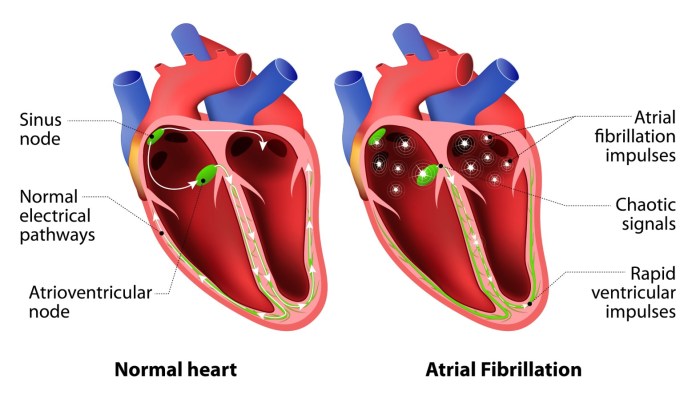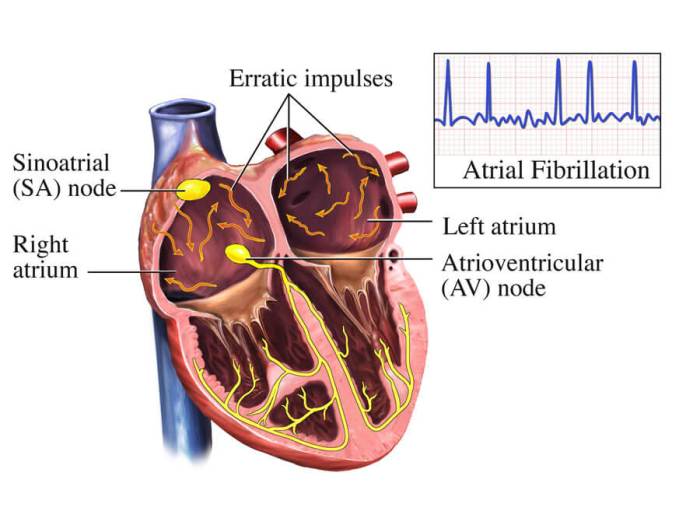What does af mean in medical terms – When it comes to medical terminology, understanding abbreviations is crucial. One commonly encountered acronym is “AF,” which can refer to various medical conditions and procedures. This guide delves into the meaning of “AF” in medical terms, exploring its significance in diagnosing and treating different health issues.
From atrial fibrillation to arterial fibrosis, we will uncover the implications of “AF” in the medical realm, empowering you with the knowledge to navigate medical discussions with confidence.
Medical Terminology

In the medical field, abbreviations are extensively used to streamline communication and documentation. One such commonly encountered abbreviation is “af”, which can represent various medical terms.
Understanding medical abbreviations is crucial for healthcare professionals to interpret medical records accurately and provide appropriate care. Patients and their families may also benefit from understanding these abbreviations to better comprehend their medical conditions and treatment plans.
Medical Conditions and Procedures Abbreviated as “af”
- Atrial Fibrillation (AFib): A heart rhythm disorder characterized by irregular and often rapid heartbeats. It can lead to blood clots, stroke, and heart failure.
- Anisocytosis: A condition in which red blood cells vary significantly in size.
- Anteroposterior (AP) View: A medical imaging technique that produces images of the body from front to back.
- Anticholinergic: A medication that blocks the effects of acetylcholine, a neurotransmitter that plays a role in muscle contraction and glandular secretions.
- Artificial Fibrin: A synthetic material used in surgical procedures to promote blood clotting and wound healing.
Atrial Fibrillation
Atrial fibrillation (AFib) is a common type of heart arrhythmia, characterized by an irregular and rapid heartbeat. It occurs when the electrical signals in the heart’s upper chambers (atria) become disorganized, causing the atria to quiver or fibrillate instead of contracting normally.
AFib can lead to serious complications, including stroke, heart failure, and blood clots.
Symptoms
The symptoms of AFib can vary depending on the individual. Some people may experience no symptoms, while others may have:
- Irregular or rapid heartbeat
- Chest pain or discomfort
- Shortness of breath
- Lightheadedness or dizziness
- Fatigue
- Confusion
- Weakness
Risk Factors
Several factors can increase the risk of developing AFib, including:
- Age (over 65)
- High blood pressure
- Heart disease
- Diabetes
- Obesity
- Sleep apnea
- Alcohol consumption
- Thyroid problems
Diagnosis
AFib can be diagnosed through various methods, including:
- Electrocardiogram (ECG)
- Echocardiogram
- Holter monitor
- Event recorder
Treatment
The treatment for AFib depends on the individual’s symptoms and overall health. Treatment options may include:
- Medications to control heart rate and prevent blood clots
- Electrical cardioversion to restore normal heart rhythm
- Catheter ablation to destroy the abnormal electrical pathways in the heart
- Surgery (in rare cases)
Anti-Fibrotic Agents: What Does Af Mean In Medical Terms

Anti-fibrotic agents are medications that inhibit or reverse the formation of fibrosis, a condition characterized by the excessive deposition of fibrous connective tissue in organs and tissues.
Fibrosis can lead to organ dysfunction and failure, and it is associated with various medical conditions, including liver cirrhosis, kidney fibrosis, and pulmonary fibrosis. Anti-fibrotic agents aim to prevent or halt the progression of fibrosis and improve organ function.
Mechanisms of Action
Anti-fibrotic agents work through various mechanisms of action, including:
- Inhibiting the production of collagen and other extracellular matrix proteins
- Promoting the breakdown of existing fibrosis
- Reducing inflammation and oxidative stress
Examples of Anti-Fibrotic Drugs
Examples of anti-fibrotic drugs include:
- Pirfenidone: Used to treat idiopathic pulmonary fibrosis (IPF)
- Nintedanib: Also used to treat IPF
- Everolimus: Used to treat kidney fibrosis
- Colchicine: Used to treat liver fibrosis
Applications of Anti-Fibrotic Agents, What does af mean in medical terms
Anti-fibrotic agents have applications in various medical conditions, including:
- Liver fibrosis: Anti-fibrotic agents can slow or halt the progression of liver fibrosis and improve liver function in patients with chronic liver diseases such as hepatitis and non-alcoholic fatty liver disease (NAFLD).
- Kidney fibrosis: Anti-fibrotic agents can prevent or slow the progression of kidney fibrosis in patients with chronic kidney disease (CKD) and may improve kidney function.
- Pulmonary fibrosis: Anti-fibrotic agents can slow the progression of pulmonary fibrosis and improve lung function in patients with IPF and other types of interstitial lung diseases.
Last Word

In conclusion, understanding the medical acronym “AF” is essential for effective communication and decision-making in healthcare. Whether it refers to atrial fibrillation, arterial fibrosis, or anti-fibrotic agents, knowing its precise meaning ensures accurate diagnosis, appropriate treatment, and informed patient involvement.
FAQ Corner
What is the most common meaning of “AF” in medical terms?
Atrial fibrillation (AFib), a heart rhythm disorder.
What are the symptoms of atrial fibrillation?
Irregular heartbeat, shortness of breath, chest pain, and dizziness.
What is the significance of understanding medical abbreviations?
Accurate interpretation of medical records, effective communication with healthcare providers, and informed decision-making.